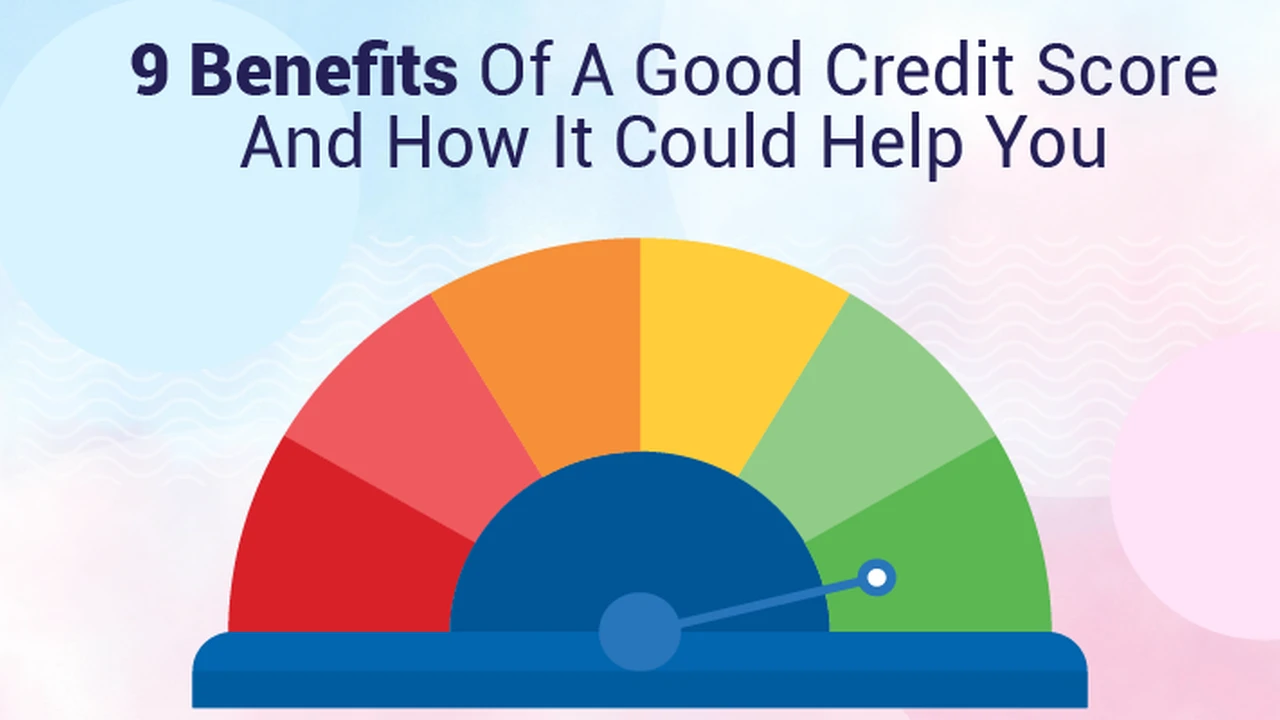The Benefits of a Good Credit Score
Learn about the numerous advantages and opportunities that come with maintaining a strong credit score.

Learn about the numerous advantages and opportunities that come with maintaining a strong credit score.
The Benefits of a Good Credit Score
Having a good credit score is like holding a golden key to a world of financial opportunities. It's not just a number; it's a reflection of your financial responsibility and reliability. Lenders, landlords, and even some employers use your credit score to assess your trustworthiness. In this comprehensive guide, we'll dive deep into the myriad benefits of maintaining a strong credit score, explore how it impacts various aspects of your life, and provide actionable advice on how to achieve and sustain an excellent credit standing. We'll also look at specific products and scenarios where a good credit score truly shines, comparing options and even discussing potential costs.
Unlocking Lower Interest Rates and Better Loan Terms
One of the most significant advantages of a good credit score is access to lower interest rates on loans and credit cards. When lenders see a high credit score, they perceive you as a low-risk borrower, meaning you're less likely to default on your payments. This translates directly into savings for you.
Mortgages and Home Loans: Your Dream Home Awaits
For many, buying a home is a lifelong dream. A strong credit score is paramount here. Lenders offer their most competitive interest rates to borrowers with excellent credit. Even a small difference in your interest rate can save you tens of thousands of dollars over the life of a 30-year mortgage. For example, on a $300,000 mortgage, a 0.5% lower interest rate could save you over $25,000 in interest payments over 30 years. This is a substantial saving that directly impacts your long-term financial health.
Product Comparison:
- FHA Loans: Often more lenient on credit scores (typically 580+), but may come with higher mortgage insurance premiums.
- Conventional Loans: Generally require higher credit scores (620+ for many, 740+ for best rates) but offer more flexibility and potentially lower overall costs without mandatory mortgage insurance if you have 20% down.
- VA Loans: For eligible veterans, these often have no down payment requirements and competitive rates, with credit score requirements varying by lender but generally looking for 620+.
Scenario: Imagine you're looking for a $300,000 home. With a credit score of 760+, you might qualify for a 30-year fixed mortgage at 6.5% interest. Your monthly principal and interest payment would be around $1,896. If your score is 650, you might only qualify for 7.5%, pushing your monthly payment to approximately $2,098. That's a difference of over $200 per month, or $2,400 per year, just because of your credit score.
Auto Loans: Driving Down Your Costs
Just like with mortgages, a good credit score can significantly reduce the interest you pay on an auto loan. This means lower monthly payments and less money spent over the life of the loan. Dealerships and banks often advertise their best rates for those with excellent credit (typically 720+).
Product Comparison:
- Bank Loans: Often offer competitive rates, especially if you have an existing relationship with the bank.
- Credit Union Loans: Known for generally lower interest rates and more personalized service.
- Dealership Financing: Can be convenient, but always compare their offers with external lenders.
Scenario: For a $30,000 car loan over 60 months, a credit score of 750 might get you an interest rate of 5%. Your monthly payment would be around $566. If your score is 620, you might be looking at 10% interest, making your monthly payment closer to $637. That's a difference of $71 per month, or over $4,200 over the life of the loan.
Personal Loans: Flexible Funding at a Lower Cost
Whether you need to consolidate debt, cover an unexpected expense, or fund a home improvement project, personal loans can be a flexible option. A good credit score ensures you get the most favorable terms, saving you money on interest and making repayment more manageable.
Product Comparison:
- Traditional Banks: Offer a range of personal loan products, often requiring good to excellent credit.
- Online Lenders (e.g., SoFi, Marcus by Goldman Sachs): Known for quick application processes and competitive rates for strong credit profiles.
- Credit Unions: Can be a good option for members, often with lower rates than traditional banks.
Scenario: A $10,000 personal loan over 36 months. With a credit score of 700+, you might get an interest rate of 8%, leading to a monthly payment of about $313. If your score is 580, you might be offered 25% interest, pushing your monthly payment to around $398. That's nearly $85 more per month, or over $3,000 in extra interest over three years.
Easier Approval for Credit Cards with Better Rewards
A good credit score doesn't just get you approved for credit cards; it gets you approved for the best credit cards. These cards often come with lucrative rewards programs, sign-up bonuses, and premium perks.
Cash Back and Travel Rewards: Making Your Spending Work for You
Credit cards designed for individuals with excellent credit (typically 700+) offer higher cash back percentages, more valuable travel points, and generous sign-up bonuses. These rewards can significantly offset your spending or fund your next vacation.
Product Comparison:
- Chase Sapphire Preferred/Reserve: Excellent for travel rewards, offering high points on dining and travel, and valuable transfer partners. Annual fees range from $95 to $550, but benefits often outweigh the cost for frequent travelers.
- American Express Platinum Card: Premium travel benefits, lounge access, and statement credits. High annual fee ($695) but unparalleled perks for luxury travelers.
- Citi Double Cash Card: Simple 2% cash back on all purchases (1% when you buy, 1% when you pay). No annual fee. Great for everyday spending.
- Capital One SavorOne Cash Rewards Credit Card: 3% cash back on dining, entertainment, popular streaming services, and groceries. No annual fee.
Scenario: A person with excellent credit (750+) can easily qualify for a Chase Sapphire Preferred card. After spending $4,000 in the first 3 months, they could earn 60,000 bonus points, worth $750 in travel through Chase Ultimate Rewards. Someone with fair credit (600) might only qualify for a secured credit card with no rewards, or a basic card with 1% cash back and no bonus, missing out on significant value.
0% APR Introductory Offers: Interest-Free Periods
Many top-tier credit cards offer 0% APR on purchases and/or balance transfers for an introductory period, often 12 to 21 months. This can be incredibly useful for making a large purchase without incurring interest immediately or for consolidating high-interest debt. These offers are almost exclusively available to those with good to excellent credit.
Product Comparison:
- Wells Fargo Reflect Card: Offers one of the longest 0% intro APR periods on purchases and qualifying balance transfers (up to 21 months). No annual fee.
- Citi Simplicity Card: Another strong contender for long 0% intro APR on balance transfers and purchases (up to 21 months). No annual fee.
- Bank of America Customized Cash Rewards Credit Card: Offers 0% intro APR for 18 billing cycles on purchases and balance transfers, plus customizable cash back categories. No annual fee.
Scenario: You need to buy new appliances costing $5,000. With a 0% APR card for 18 months, you can pay $277.78 per month and pay off the entire amount without any interest. If you had a card with a standard 20% APR, you'd pay an additional $800+ in interest over 18 months.
Easier Approval for Rental Applications and Utilities
It's not just about loans. Your credit score can influence where you live and how easily you set up essential services.
Renting an Apartment: Your Next Home
Landlords often check credit scores as part of their tenant screening process. A good credit score signals that you are reliable and likely to pay your rent on time. This can give you an edge in competitive rental markets and may even reduce the security deposit required.
Scenario: In a competitive city, two applicants are vying for the same apartment. Both have similar income, but one has a credit score of 720 and the other has 580. The landlord is far more likely to choose the applicant with the higher credit score, as it indicates a lower risk of late or missed rent payments.
Utility Services: No Deposit Needed
Utility companies (electricity, gas, water, internet, phone) often run a credit check when you sign up for new service. A good credit score can waive the need for a security deposit, saving you upfront cash. These deposits can range from $50 to several hundred dollars per utility.
Scenario: Moving into a new place, you need to set up electricity, gas, and internet. With excellent credit, you might pay no deposits. If your credit is poor, you could be asked for a $150 deposit for electricity, $100 for gas, and $50 for internet, totaling $300 in upfront costs.
Better Insurance Premiums: Saving on Protection
In many states, insurance companies use credit-based insurance scores to help determine your premiums for auto and home insurance. A higher score often leads to lower premiums, as it suggests you are a more responsible individual, less likely to file claims.
Product Comparison:
- Major Auto Insurers (e.g., GEICO, Progressive, State Farm): All use credit scores as a factor in pricing.
- Home Insurers (e.g., Allstate, Liberty Mutual, Farmers): Similarly, credit scores influence home insurance rates.
Scenario: Two drivers, same age, same car, same driving record. The one with a credit score of 780 might pay $1,200 annually for auto insurance, while the one with a score of 600 might pay $1,800 or more. That's a $600 difference per year, purely based on credit.
Easier Access to Higher Credit Limits
As your credit score improves, credit card issuers are more likely to increase your credit limits. This can be beneficial for several reasons:
- Lower Credit Utilization: A higher credit limit, assuming your spending remains the same, lowers your credit utilization ratio (the amount of credit you're using compared to your total available credit). A lower utilization ratio (ideally below 30%) is good for your credit score.
- Financial Flexibility: Provides a larger safety net for emergencies or large purchases.
Scenario: You have a credit card with a $5,000 limit and typically spend $1,500 per month. Your utilization is 30%. If your credit score improves and the issuer increases your limit to $10,000, your utilization drops to 15% (assuming the same spending), which is a positive signal to credit bureaus.
Increased Negotiating Power
A strong credit score gives you leverage. When you know you're a low-risk borrower, you can confidently negotiate for better terms on loans, credit cards, and even some services. Lenders are more willing to work with you to retain your business.
Scenario: You're applying for a new credit card and see an offer for a 15% APR. With an excellent credit score, you might call the issuer and inquire if they can offer a lower rate, perhaps 12%. They might be willing to do so to secure a high-quality customer.
Faster Approval Times
When your credit profile is strong, lenders can process your applications much faster. Less scrutiny is needed, leading to quicker approvals for loans, credit cards, and other financial products. This can be crucial in time-sensitive situations.
Scenario: You need a personal loan quickly for an emergency. With a high credit score, you might get approved and have funds deposited within 24-48 hours from an online lender. With a poor score, the process could take days or weeks, or you might be denied altogether.
Peace of Mind and Financial Security
Beyond the tangible financial benefits, a good credit score provides immense peace of mind. You know that if an unexpected expense arises, you have access to affordable credit. It reduces financial stress and opens doors to opportunities that might otherwise be out of reach.
How to Build and Maintain a Good Credit Score
Achieving a good credit score isn't magic; it's a result of consistent, responsible financial habits. Here are the key pillars:
Pay Your Bills on Time: Consistency is Key
Payment history is the most significant factor in your credit score (35% of your FICO score). Always pay your bills on time, every time. Set up automatic payments or reminders to ensure you never miss a due date.
Keep Credit Utilization Low: Don't Max Out
Credit utilization (the amount of credit you're using compared to your total available credit) accounts for 30% of your FICO score. Aim to keep your utilization below 30% across all your credit accounts. For example, if you have a total credit limit of $10,000, try to keep your outstanding balance below $3,000.
Length of Credit History: Time Heals All Wounds
The longer your credit history, the better (15% of your FICO score). Avoid closing old credit accounts, even if you don't use them frequently, as this can shorten your average account age.
Credit Mix: A Healthy Blend
Having a mix of different types of credit (e.g., credit cards, installment loans like mortgages or auto loans) can positively impact your score (10% of your FICO score). This shows you can responsibly manage various forms of credit.
New Credit: Be Mindful of Applications
Applying for too much new credit in a short period can temporarily ding your score (10% of your FICO score). Each hard inquiry can lower your score by a few points. Only apply for credit when you genuinely need it.
Tools and Resources to Monitor Your Credit
Staying on top of your credit score is easier than ever with various free and paid tools.
Free Credit Monitoring Services: Stay Informed
Many credit card companies and financial institutions offer free access to your FICO score or a VantageScore. Services like Credit Karma (VantageScore) and Experian (FICO Score 8) provide regular updates and insights into your credit report.
Product Comparison:
- Credit Karma: Provides VantageScore 3.0 from TransUnion and Equifax. Offers credit monitoring, identity theft protection, and personalized recommendations. Free.
- Experian: Offers free Experian FICO Score 8, credit report, and monitoring. Can upgrade for additional features. Free basic service.
- MyFICO: Provides FICO scores from all three bureaus, plus various industry-specific FICO scores. Paid service, but offers the most comprehensive FICO data. Plans start around $29.95/month.
Annual Credit Report: Your Right to Review
You are entitled to a free copy of your credit report from each of the three major credit bureaus (Equifax, Experian, and TransUnion) once every 12 months. You can access these at www.annualcreditreport.com. Regularly reviewing your reports helps you spot errors or fraudulent activity that could negatively impact your score.
Addressing Common Misconceptions About Credit Scores
There are many myths surrounding credit scores. Let's clear up a few:
- Checking your own credit score hurts it: This is false. Checking your own score (a 'soft inquiry') has no impact on your credit score.
- Closing old credit cards helps your score: This is generally false. Closing old accounts can shorten your credit history and increase your credit utilization, both of which can negatively impact your score.
- Carrying a balance helps your score: False. You don't need to carry a balance to build good credit. Paying your statement balance in full each month is the best approach.
In essence, a good credit score is a powerful financial asset. It's a testament to your financial discipline and opens doors to significant savings and opportunities across various aspects of your life. By understanding how your credit score works and consistently practicing responsible financial habits, you can build and maintain an excellent credit standing, paving the way for a more secure and prosperous financial future.
:max_bytes(150000):strip_icc()/277019-baked-pork-chops-with-cream-of-mushroom-soup-DDMFS-beauty-4x3-BG-7505-5762b731cf30447d9cbbbbbf387beafa.jpg)






